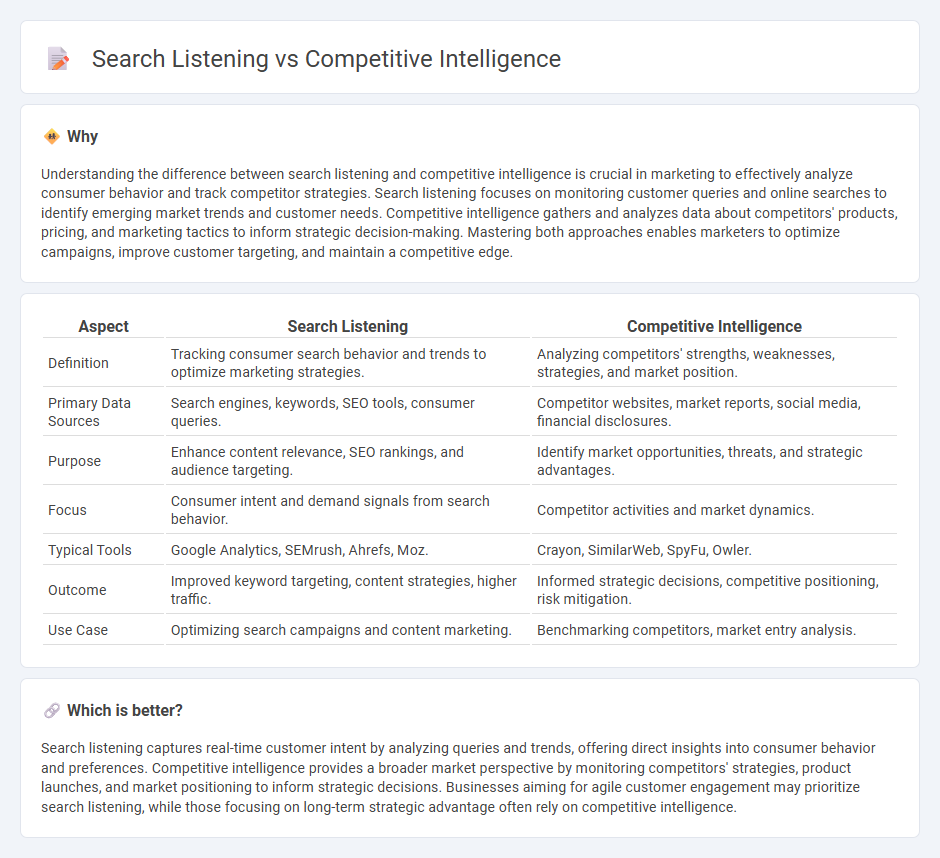
Search listening focuses on monitoring and analyzing consumer queries and online search behavior to understand market demand and trends. Competitive intelligence involves systematically gathering and analyzing data about competitors' strategies, strengths, and weaknesses to inform business decisions. Explore deeper insights into how these approaches can optimize your marketing strategy.
Why it is important
Understanding the difference between search listening and competitive intelligence is crucial in marketing to effectively analyze consumer behavior and track competitor strategies. Search listening focuses on monitoring customer queries and online searches to identify emerging market trends and customer needs. Competitive intelligence gathers and analyzes data about competitors' products, pricing, and marketing tactics to inform strategic decision-making. Mastering both approaches enables marketers to optimize campaigns, improve customer targeting, and maintain a competitive edge.
Comparison Table
| Aspect | Search Listening | Competitive Intelligence |
|---|---|---|
| Definition | Tracking consumer search behavior and trends to optimize marketing strategies. | Analyzing competitors' strengths, weaknesses, strategies, and market position. |
| Primary Data Sources | Search engines, keywords, SEO tools, consumer queries. | Competitor websites, market reports, social media, financial disclosures. |
| Purpose | Enhance content relevance, SEO rankings, and audience targeting. | Identify market opportunities, threats, and strategic advantages. |
| Focus | Consumer intent and demand signals from search behavior. | Competitor activities and market dynamics. |
| Typical Tools | Google Analytics, SEMrush, Ahrefs, Moz. | Crayon, SimilarWeb, SpyFu, Owler. |
| Outcome | Improved keyword targeting, content strategies, higher traffic. | Informed strategic decisions, competitive positioning, risk mitigation. |
| Use Case | Optimizing search campaigns and content marketing. | Benchmarking competitors, market entry analysis. |
Which is better?
Search listening captures real-time customer intent by analyzing queries and trends, offering direct insights into consumer behavior and preferences. Competitive intelligence provides a broader market perspective by monitoring competitors' strategies, product launches, and market positioning to inform strategic decisions. Businesses aiming for agile customer engagement may prioritize search listening, while those focusing on long-term strategic advantage often rely on competitive intelligence.
Connection
Search listening harnesses real-time data from consumer queries and online conversations, providing critical insights into market trends and customer preferences. Competitive intelligence analyzes these insights alongside competitors' strategies, enabling businesses to identify opportunities and threats in the marketing landscape. Together, they form a data-driven approach that enhances decision-making and optimizes marketing campaigns for better targeting and customer engagement.
Key Terms
Market Analysis
Competitive intelligence gathers in-depth data on competitors' strategies, market positioning, and product performance to inform strategic decision-making. Search listening captures consumer trends, keywords, and sentiment analysis to understand market demand and customer preferences in real-time. Explore the differences and applications of both for comprehensive market analysis insights.
Social Sentiment
Competitive Intelligence leverages data from various sources to analyze market trends, competitor activities, and customer preferences, providing businesses with strategic insights and actionable intelligence. Search listening emphasizes monitoring and analyzing social media conversations to gauge public opinion and social sentiment, enabling companies to understand brand perception and customer emotions in real time. Explore how integrating these approaches can enhance your social sentiment analysis for more effective decision-making.
Competitor Benchmarking
Competitive intelligence gathers, analyzes, and interprets data about competitors' strategies, market positions, and performance metrics to inform strategic decisions. Search listening monitors online conversations, search trends, and consumer sentiment to detect emerging competitor activities and market shifts in real time. Explore how integrating both approaches enhances competitor benchmarking and sharpens market insights.
Source and External Links
Competitive intelligence - Wikipedia - Competitive intelligence (CI) is the process of systematically collecting, analyzing, and distributing information about competitors, market trends, and the external business environment to support strategic decision-making and improve organizational performance.
What Is Competitive Intelligence? Overview & How to Get It - Semrush - CI involves gathering and analyzing data on competitors, industry trends, and customer expectations to identify opportunities, anticipate market shifts, and benchmark performance against rivals.
Competitive Intelligence - SJSU - School of Information - CI is the systematic process of monitoring, analyzing, and disseminating external information--such as data on competitors, markets, and customers--to provide decision-makers with actionable insights for strategic planning and threat mitigation.
 dowidth.com
dowidth.com